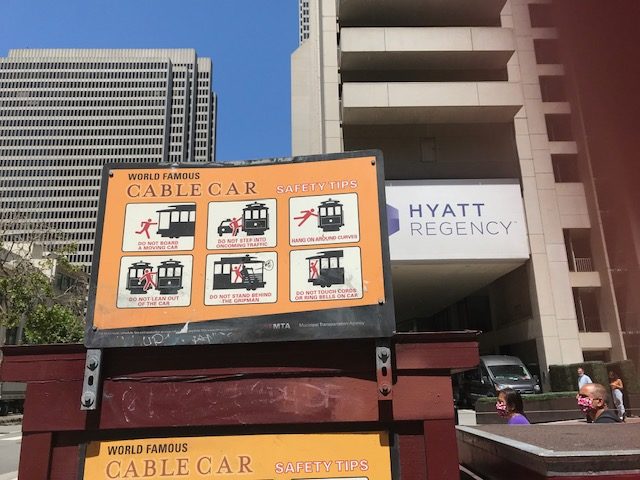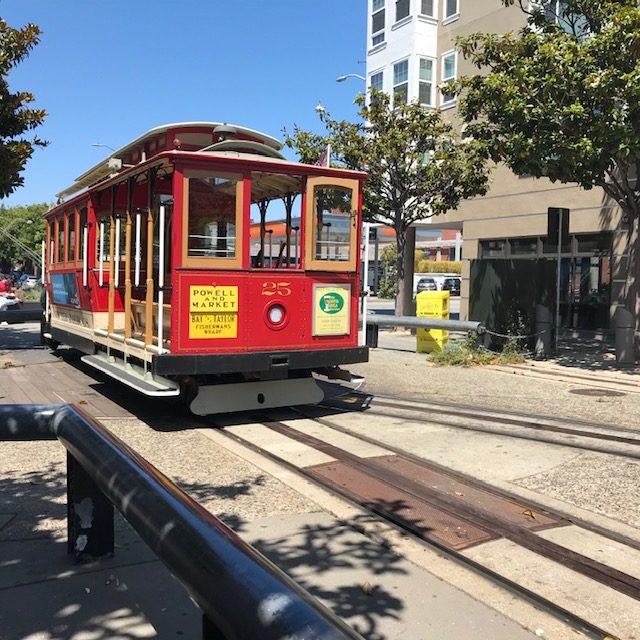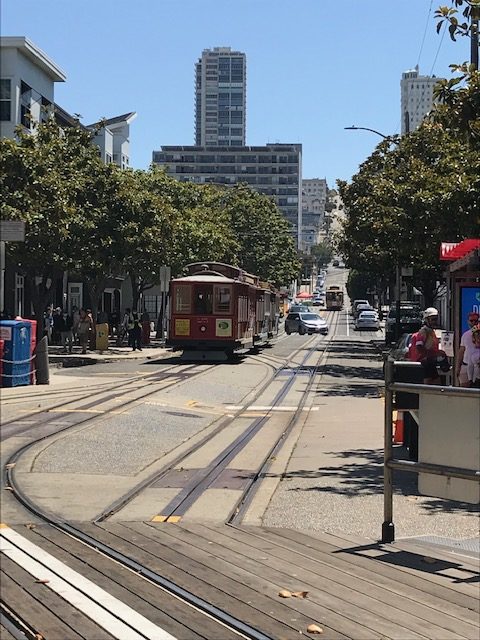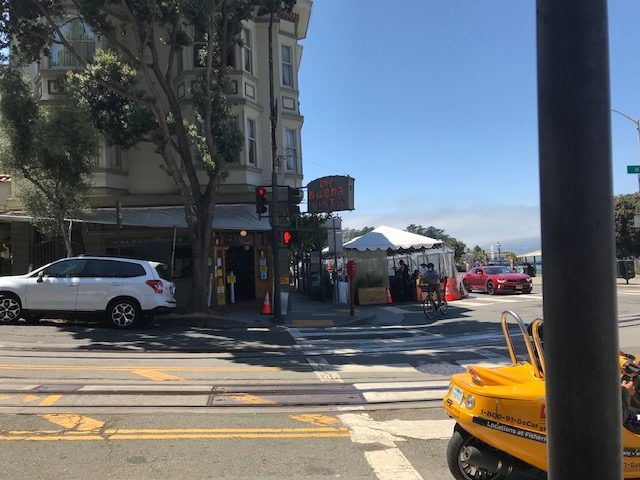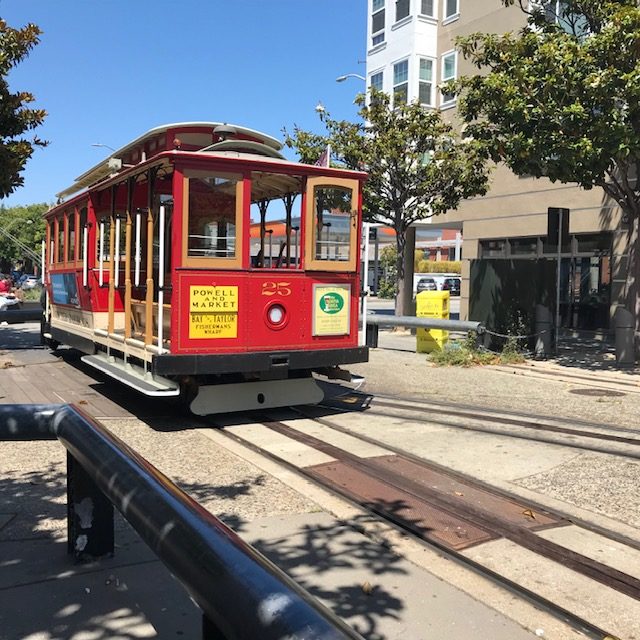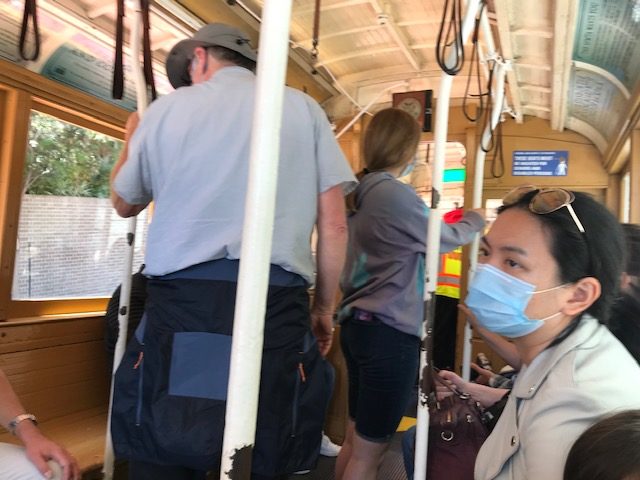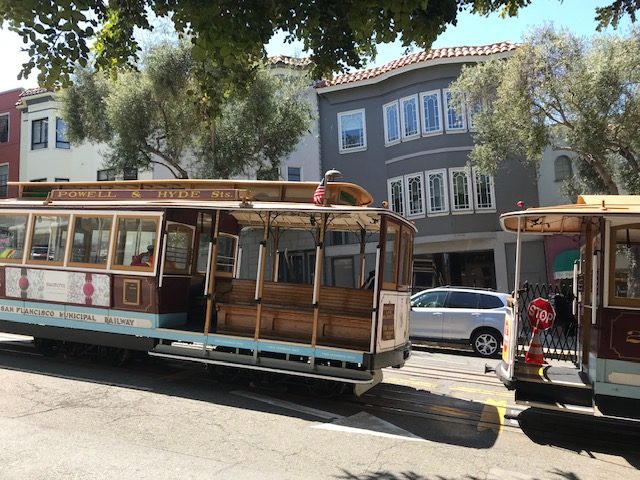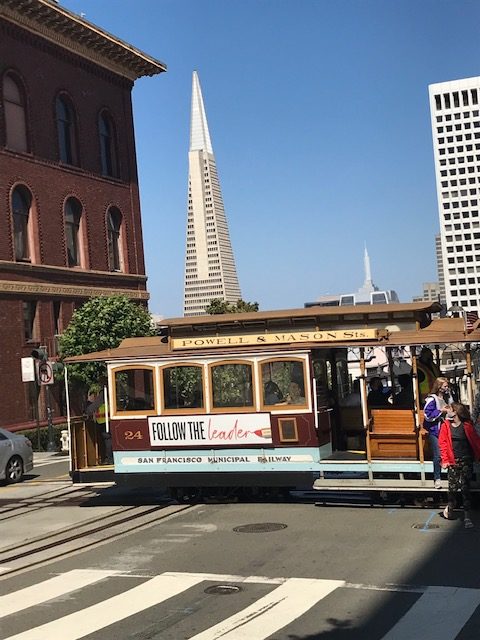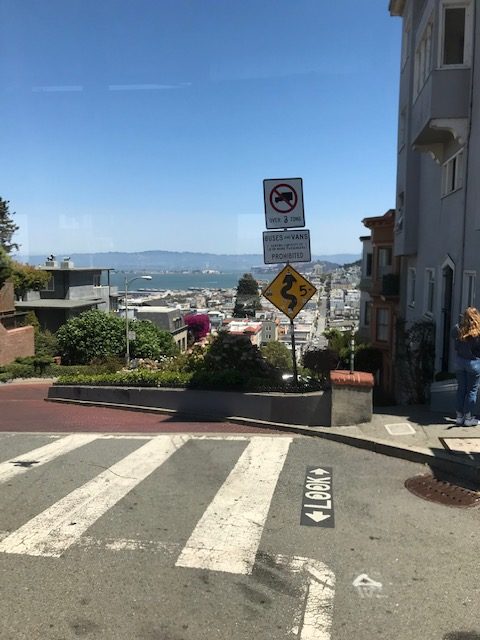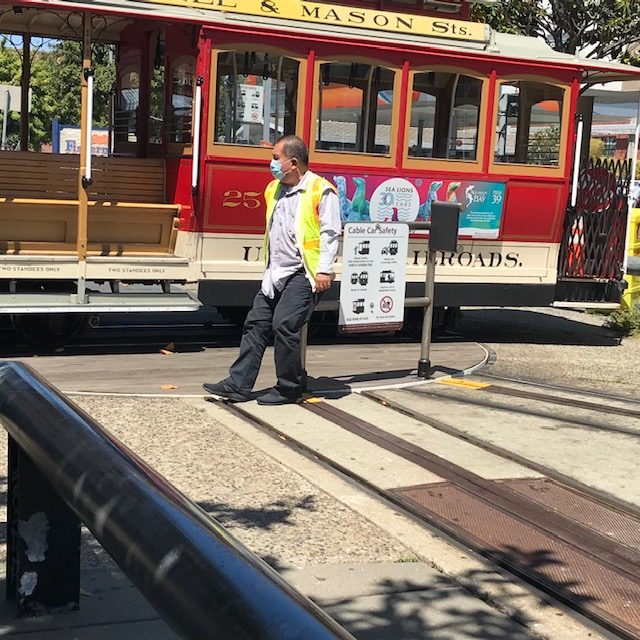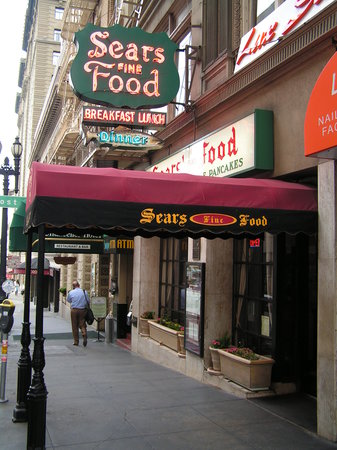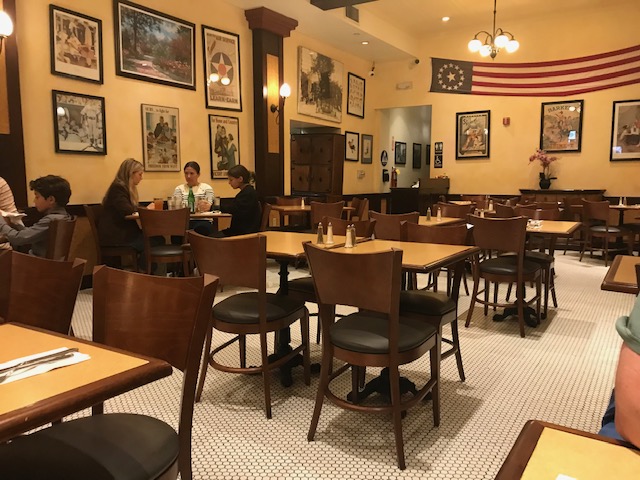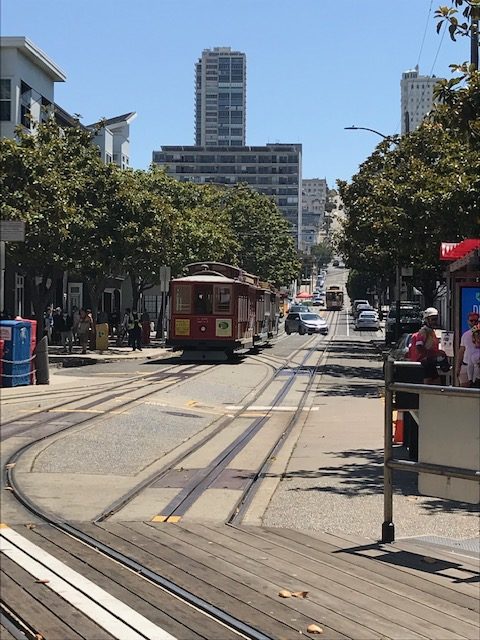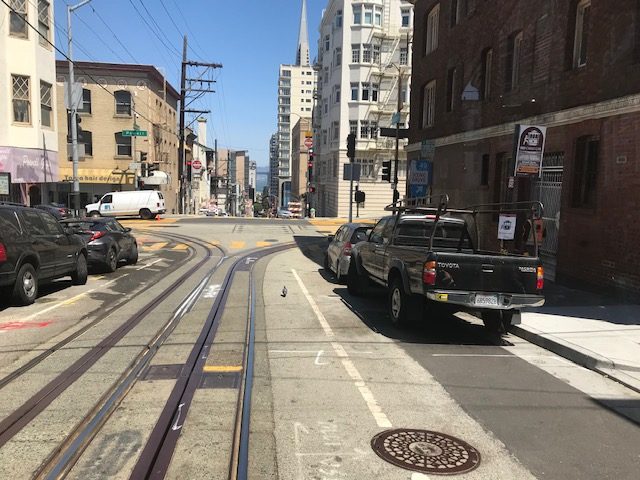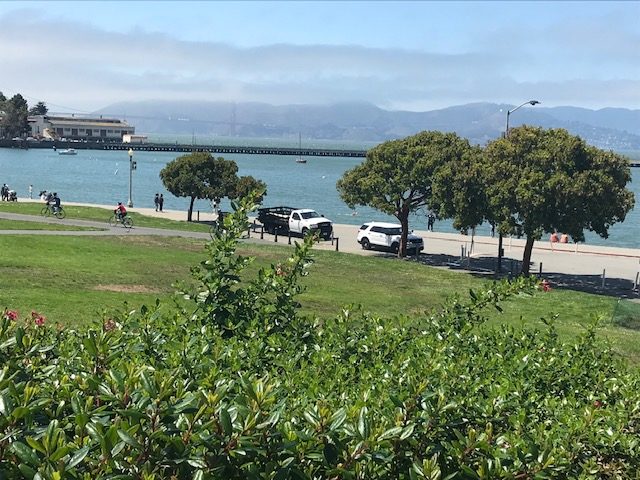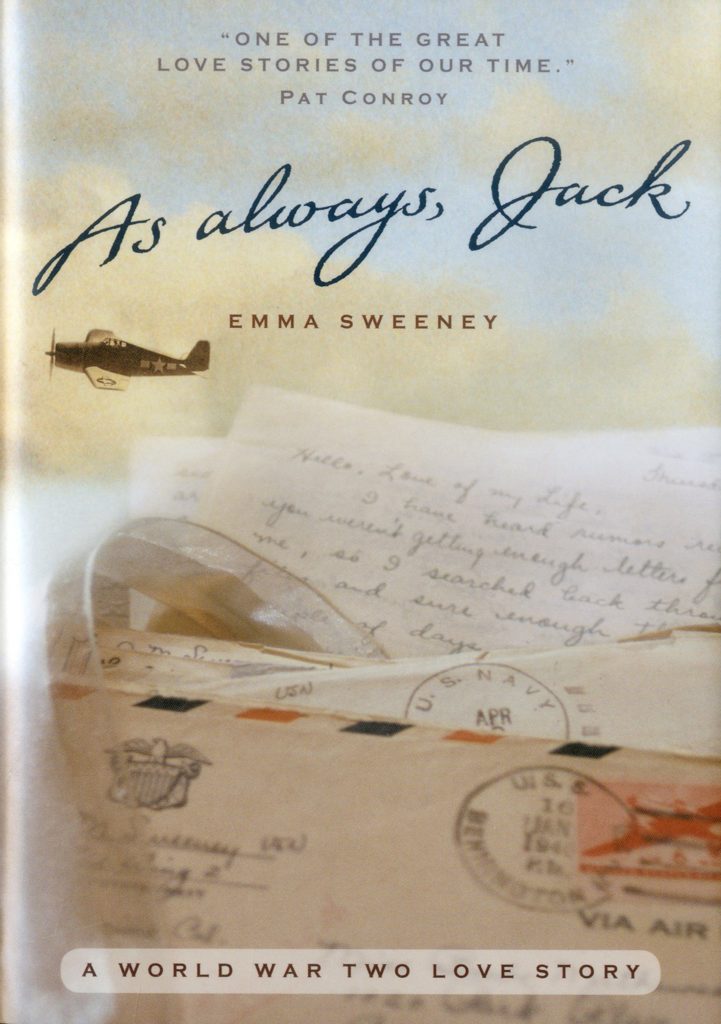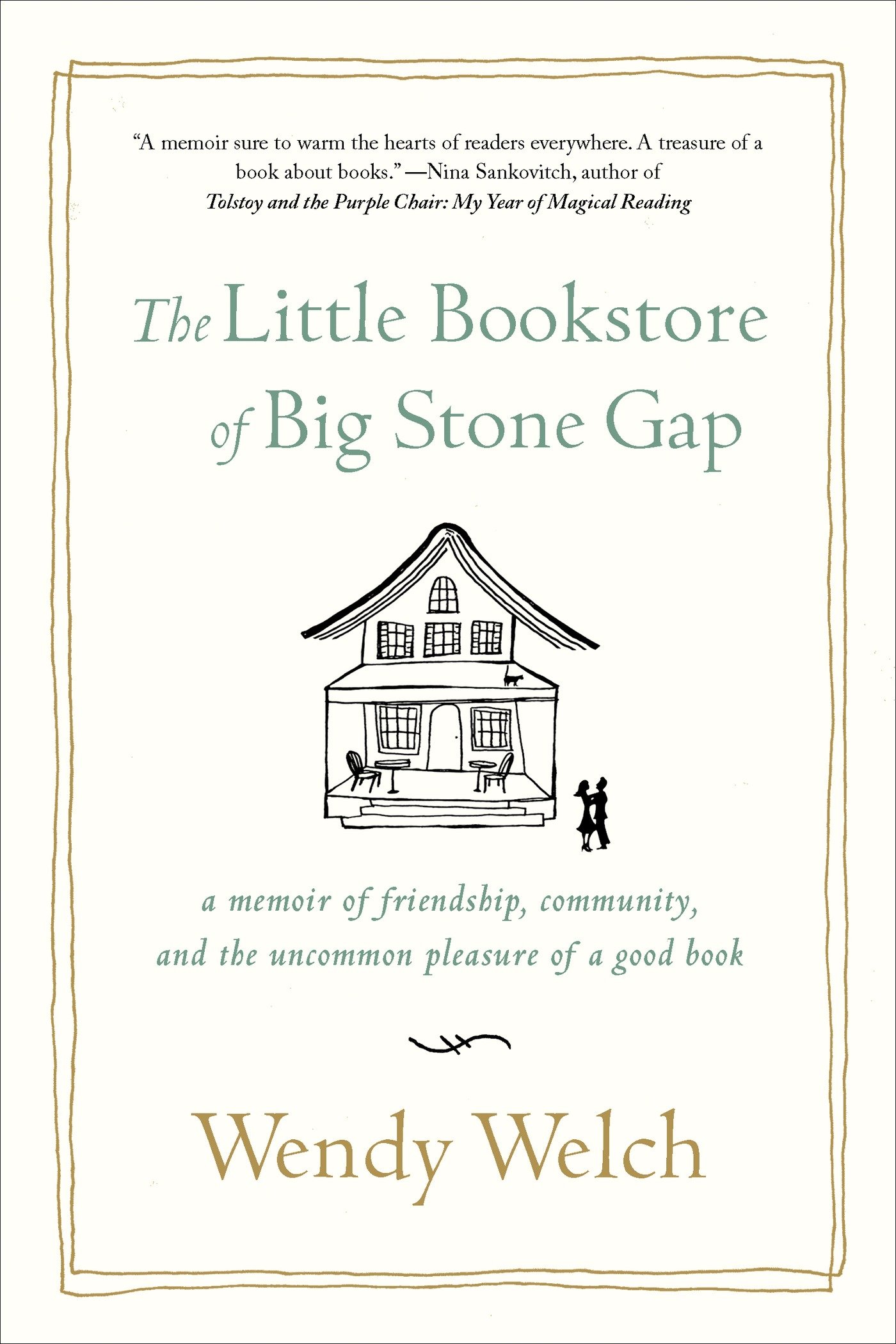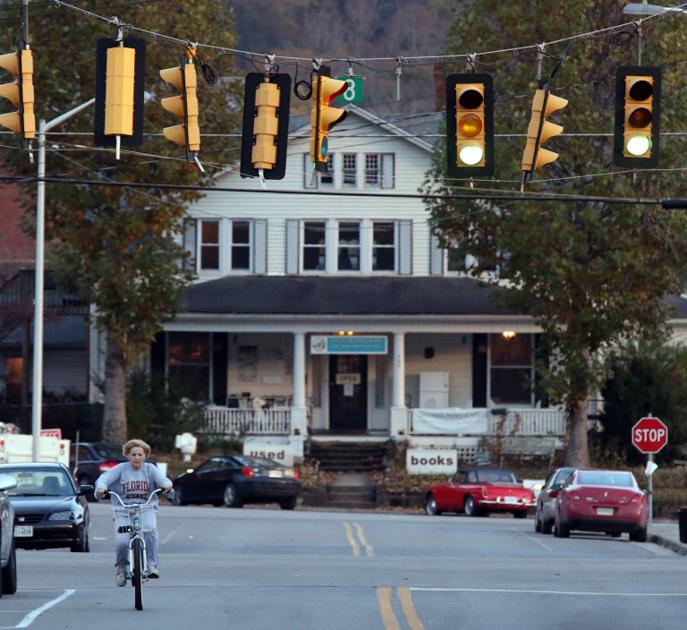Welcome Back
Our beloved cable cars shut in the spring of last year due to the pandemic and remained out of service ever since. During this down time they worked on the cable system under the streets, as well as the cars themselves.
Now they’re back and for the month of August free to all (normally an astounding $8 each ride). One beautiful sunny day last week, Husband and I donned our masks and rode every cable car line.
First thing we noticed was how empty downtown was – this area is normally wall-to-wall pedestrians and traffic – eerie.
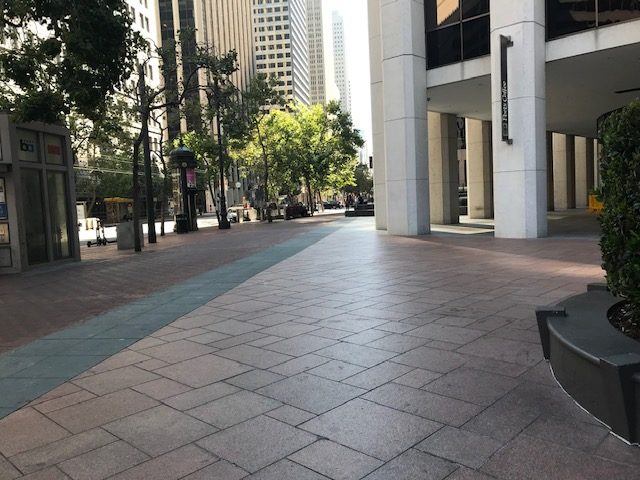
First we reviewed the new cautionary signs on how to ride a cable car. No such rules before — we laughed at how we used to run for the car as it was moving and hang on the outside. A bygone era it seems.
It was fun to play tourist in our own city and we noticed just a few of our actual tourists are back.
The Buena Vista has opened and serving their famous Irish Coffee – outside under the tent. But we didn’t stop this time.
The cars were relatively empty and everyone wore masks.
We had lunch at the famous Sears Fine Food – a San Francisco institution since 1938. Normally, it’s packed with a long waiting line out front. Not this day.
We went up and down the hills of San Francisco – our trusty cable cars pulling us up and gripping us down.
The fog waited until we were done to start rolling in.
It was one of those great days – wish you were here.
As Always, Jack by Emma Sweeney
Whenever we travel to a different location, I like to visit a bookstore and search for local authors or books set in the area.
When we were in Coronado, California – (yikes, over two years ago now) – I bought this little book written by a woman raised on the island. I only just read As Always, Jack, having re-discovered it when shopping my home shelves during Covid.
Ms. Sweeney never knew her father, Jack, who shared a whirlwind romance with her mother via letters while stationed in the Pacific just after WWII. This slim volume, contains the actual collection of letters from her navy pilot father to her mother during the last months of WWII.
They met in Coronado and knew each other a mere two weeks before he got shipped off. Through their letters they got to know each other, and fell in love. A ten year marriage and five children were the result. To avoid any confusion, I’ll tell you that the author’s mother was pregnant with her when her father’s plane went down during a routine Navy flight.
By the time the Ms. Sweeney was old enough to start wondering about the father she’d never known, her mother had remarried. And with a reluctance to revisit the past, details about her father and their romance were scarce. Following her mother’s passing, Emma discovered a ribbon-tied packet of fragile letters and a photo — through which she finally met her father.
These letters depict far more than the typical navy pilot meets and falls in love with a beautiful California girl. Jack’s sense of humor and wit shines through. His personality is bold and cocky – as he woos, cajoles, and romances this beautiful girl from Coronado. Yet as the same time, he shows his insecurity that she doesn’t love him as much, and grows despondent when her letters don’t arrive.
Well, HALLELUJAH! FOUR letters – ranging from April 28th to May 27th – came home today and the world looks much different. One was sealed with a kiss, one was sealed with a Big kiss, one was sealed with a peck (?), and one was just sealed, which means I got spit on.
Jack tells of the foreign culture (Shanghai, Japan) boredom, lousy food, routine and when he writes about his actual flights, — he glosses over the obvious danger.
I feel pretty good, even though the immediate future isn’t so bright. Not enough of you in it.
Throughout the letters are Jack’s comical illustrations, 1940’s slang and references – from the films he sees on base to the virtues of the Fibber MacGee and Molly radio program – over which they disagree. Jack teases his girlfriend by mixing up her name, adding ten years to her age, and speculating on the number of children they will someday have.
After his release orders come through, and Jack is waiting for transport back to the States, his letters become a bit more subdued as he worries that after five months apart, that she won’t feel the same about him. But he tries to hide his jitters behind his ever resilient humor.
The only disappointment for this reader was that, through no fault of the author, As Always, Jack is one sided – only his letters survived. How wonderful it would have been to have the full correspondence. I’m sure Ms. Sweeney feels the same way.
As Always, Jack is an intensely personal gift from the author — not only by the sharing of her father’s letters, but also with the introduction and afterword she wrote to give a fuller picture of her parents endearing romance.
From Scratch by Tembi Locke
Friends and loved ones often say I have too many books. I still love these clueless souls, but they don’t understand. It’s not that I have too many books, it’s that these books are quite happy on my shelves, just waiting for me to find them.
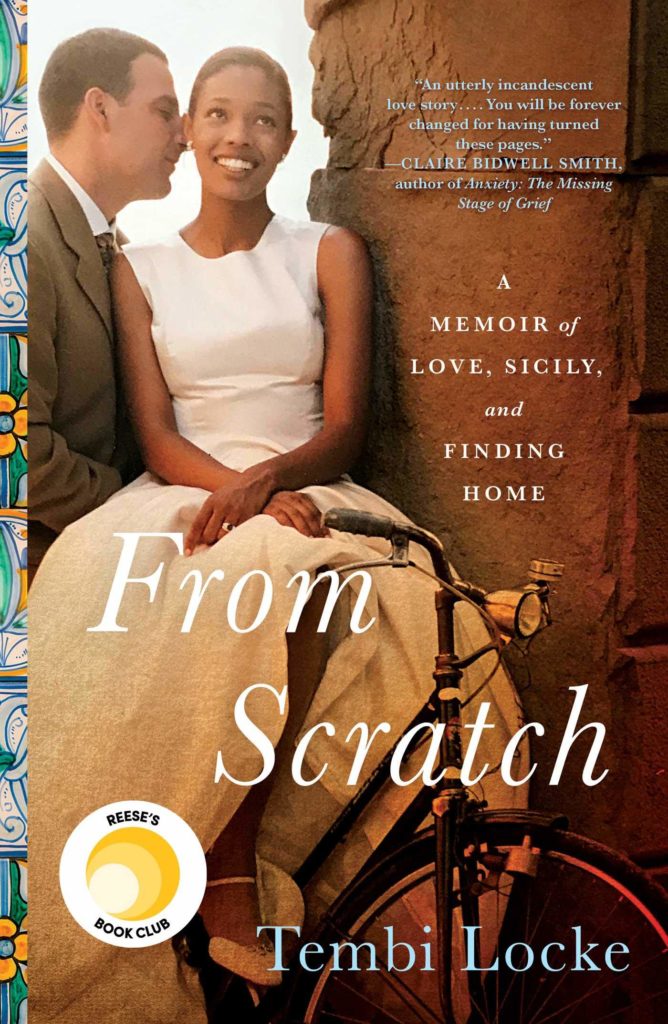
Such was the case with From Scratch. A friend gave me this book and because we have different tastes in reading, it has languished in my ‘maybe I’ll read, maybe I won’t’ section. Rattling around the house on a rainy afternoon, I picked it up and decided to give it a try. I didn’t have any idea what I was getting into when I started this book, but before long I was deeply entangled in a beautiful story of love and loss, and all that comes with it.
“In Sicily, every story begins with a marriage or a death. In my case it’s both. And so it was that I found myself driving a rusted Fiat through a winding country road on the outskirts of Alimunusa, a small Sicilian village, with my husband’s ashes in a small wooden box tucked between my legs.”
So begins this luscious memoir by Tembi Locke (that word luscious will be back). Tembi is an American television and film actress and she recounts her college semester abroad in Florence where she meets Saro, a chef. At first, Tembi is not interested in a relationship. But, for Saro, it’s love at first sight. She tries to discourage him, but he doesn’t give up. He makes her amazing romantic meals in his restaurant, he brings her flowers, in short, he woos her until she falls for him too.
When the semester ends and Tembi goes back to California, Saro eventually comes to the US where their relationship blossoms. They marry in Florence several years later. They build a happy life in Los Angeles, with fulfilling careers, luscious meals, deep friendships and the love of their lives: a baby girl they adopt at birth.
Don’t leave me now folks, there’s so much more.
There are gorgeous food descriptions and beautiful Sicilian countryside. There are cultural and family dramas to work through when Saro’s Italian family rejects Tembi because she is black. They navigate their way through two clashing cultures and eventually create their own.
Saro develops cancer and they struggle through ten years of his sickness …and as we know from the first paragraph, sadly he dies. Yes, From Scratch is sad (have tissues nearby) but it is also a fascinatingly upbeat tale, that once I was 50 pages in, I had to give it my complete attention.
Saro’s death changes Tembi’s relationship with his family. After his death, Tembi returns to Saro’s family home every summer with their daughter. And, against the backdrop of Sicilian culture & countryside — they heal and cook together – a new relationship and mutual appreciation develops. They connect as a family and Saro’s family lay aside their previous rejection of both the marriage and her. Tembi and her daughter soon also accept and understand the Sicilian culture:
I was witnessing another example of the way community functioned so tightly here, for better or for worse. Each of the women on this street will be called upon and expected to participate in the illness or death of the others. They held one another up, it was a custom as ancient and alive as the ruins of Sicily’s Harrah temple.
From Scratch shines with the food –there are luscious (there’s that word again) descriptions of food and how it bridged relationships, how it can be both comforting and sensual, but mostly it’s shows food’s significance to every family and culture.
Tembi tells of the Sicilian homemade tomato sauce, fresh made pasta, olive oil made from olives grown on the family’s land, fresh bread, lemons, herbs, and bonus — there is a collection of these family recipes at the end of the book — many of which I’ve marked to try.
This beautiful reflection on grief and healing is sometimes overly dramatic, but the majority of the writing is poetic, warm and heartfelt. This memoir is an age-old story of love, loss, reconciliation and belonging. Yes, it’s sad but yet also joyful. The food, the language, the love, the families– all of it — well just luscious.
From Scratch was a captivating read. I’m glad I found it on my happily-waiting book shelves.
After I closed the book, I made Husband his favorite pasta sauce and hugged him close and tight.
Educated by Tara Westover
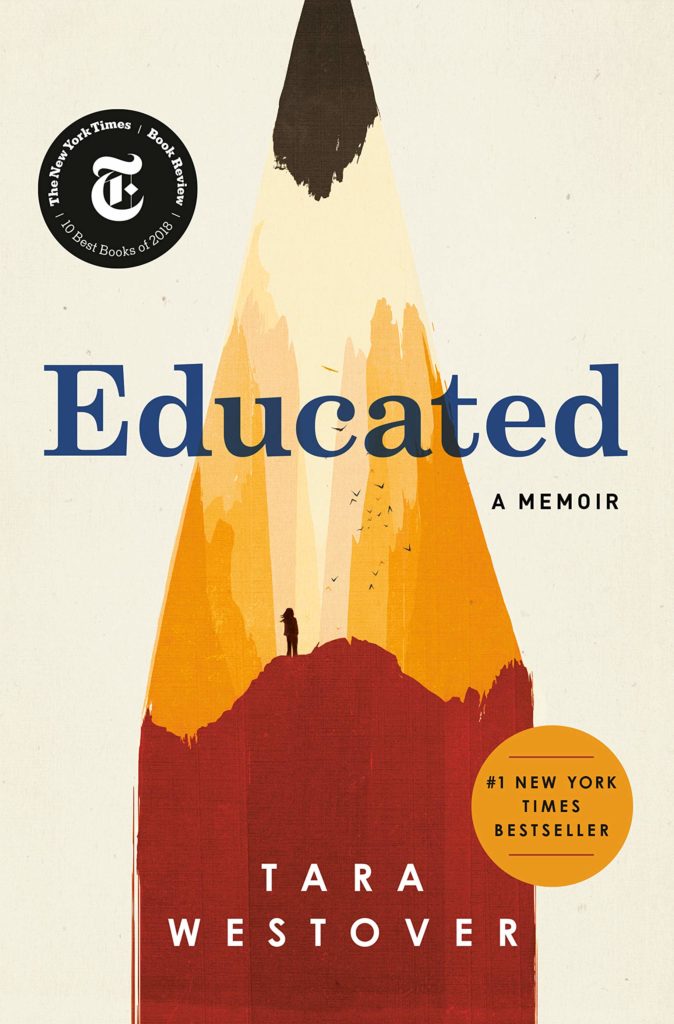
I’m late to the party on this one. It seems everyone has read this gripping memoir about a young girl who, kept out of school, escapes her survivalist family, goes on to college and eventually earns degrees from Harvard and Cambridge. Ms. Westover has been interviewed by all the major press and television outlets and Educated was on the bestseller list for many, many weeks.
Tara’s father, Gene Westover is a self-appointed prophet, with a psychotic nature, as well as revolutionary religious beliefs. He traumatizes his family both emotionally and physically. His children are indentured workers for his scrap metal business — and they suffer burns, head injuries, and deep wounds. No medical intervention was allowed, so these dreadful injuries are treated at home with the mother’s homemade collection of herbs, tinctures, and salves. The children and their mother are manipulated and controlled by Gene who demands loyalty at all costs.
On the highway below, the school bus rolls past without stopping. I am only 7, but I understand that it is this fact more than any other that makes my family different. We don’t go to school. Dad worries that the government will force us to go, but it can’t because it doesn’t know about us. Four of my parents’ seven children don’t have birth certificates. We have no medical records because we were born at home and have never seen a doctor or nurse. We have no school records because we’ve never set foot in a classroom.
I kept having to put Educated aside, not because of the writing — no, no — Ms. Westover writes beautifully — but because this book is so very hard. This is no sugar coated story – this is grim reality and I needed many breaks from this mesmerizing but cruel account.
I no longer needed breaks once Tara strikes out on her own and surmounts many, many hurdles — from passing the testing required to get into Brigham Young, to interacting with the outside world. She makes friends, gains mentors and discovers just how much she doesn’t know. This second half of the book tells of her struggle to be ‘educated’ and her pursuits to pass the next course, the next level, the next requirement which takes her eventually to earn a PhD from Cambridge University.
During this time Tara goes back home to try and help her sister in law (married to Tara’s abusive brother) and then again to nurse her father after a horrific burn accident. Each visit leaves her with a new perspective that even this craziest of upbringing was, in her child’s view — normal.
Not knowing for certain, but refusing to give way to those who claim certainty, was a privilege I had never allowed myself. My life was narrated for me by others. Their voices were forceful, emphatic, absolute. It had never occurred to me that my voice might be as strong as theirs.
Having grown up loving school and education, I found the notion of being deprived even the basic education just heartbreaking. I finished Educated feeling wrung out, yet I still must recommend this incredible memoir. Educated is beautifully written, heartrendingly insightful, and uplifting.
So if you think your New Year’s resolutions are insurmountable – read Educated – getting back to the gym will seem like a cake walk.
A digital review copy was kindly provided by Random House via Netgalley.
The Little Bookstore of Big Stone Gap
Wendy Welch and her Scottish husband, Jack Beck, impulsively bought a huge Victorian home in the town of Big Stone Gap, Virginia, with the intent of transforming it into a used bookstore.
Unfortunately, they had much working against them. Big Stone Gap is not exactly welcoming to strangers and its economically depressed state does not make it an ideal business location. Additionally it didn’t help that they lacked a business plan or even any books to start with.
The couple remained undaunted and The Little Bookstore recounts their struggles and experiences as they build their beloved used bookstore and a readers’ community around the store.
I’ve dreamed of it — My Very Own Bookstore, and appropriately, this book has lived on my shelf for years. I grabbed it to re-read, as I’m currently traveling in the area, and their Big Stone Gap, Virginia bookstore — called Lonesome Pine Used Books — is on my itinerary. (Have convinced Husband it will be a nice drive, we can stop for a nice lunch, and it’s really not at all out of the way. Husband nodded and remained silent — after 40 years, he’s on to me.)
But back to the book, The Little Bookstore is a pleasant, breezy memoir of opening a bookstore in a small town and working really hard, learning on the fly, and caring enough about books and people to go from newcomers (or ‘Come-from-Aways’) to an integral part of a community.
The author writes about the economically depressed area, the isolation of the community and especially how becoming part of such a community is sometimes hard work and sometimes serendipity.
Yet upon re-reading, I noticed that while Ms. Welch obviously has great heart — she loves her store, her books, and the many cats and dogs she rescues — yet, she sometimes treads into meanness with passive-aggressive observations about Big Stone Gap’s sometimes small-minded inhabitants. Perhaps this is due to the endless struggle the couple face as they try to make the bookstore a success both financially and socially.
That little niggle aside, this charming book is chocked full of little treasures of humor, social insight, literary observations, and an over-arching love of books and book people. Certainly a must-read memoir for anyone who ever dreamed of running a bookstore or just loves them.
My plans to visit Lonesome Pine Books, are in shatters. Sadly, Wendy and Jack closed it down in July. Sighh ~~here’s photo of the now-closed shop:
You can read more about Wendy, Jack and the bookstore on their blog HERE.
Another tidbit, Big Stone Gap is the hometown of the author, Adriana Trigiani, whose first novel novel of the same name was made into a film back in 2015. The bookstore makes a cameo appearance– Trailer HERE.
Library score…
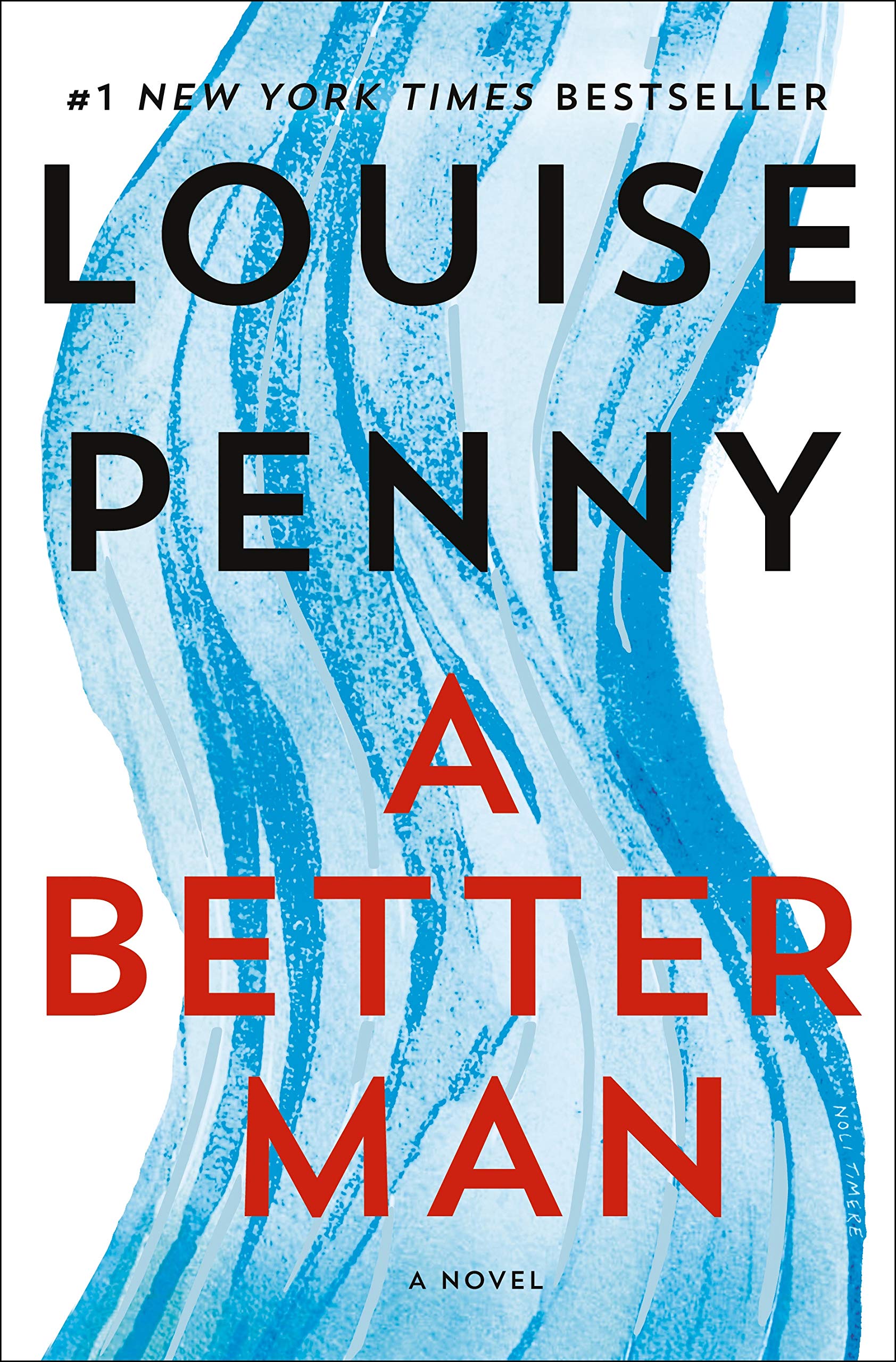 I woke up to a beautiful morning, made even better by the notice that my latest hold was ready at my local library branch – Score! I was out the door, walking over as their doors opened.
I woke up to a beautiful morning, made even better by the notice that my latest hold was ready at my local library branch – Score! I was out the door, walking over as their doors opened.
Longtime Book Barmy followers may have noticed this is the first year I haven’t been able to preview Louise Penny’s latest installment.
Sadly, I am no longer one of Ms. Penny’s advanced readers. I was denied an early copy of this, her newest book, A Better Man.
I’m trying to be a grown up about this and must come to grips with the obvious — Ms. Penny’s books are immediate best-sellers without the support of my little Barmy book blog.
Husband gamely tried to cheer me up by pointing out that I did come up quickly on the long waiting list for the library book – but I’m still pouting ~~
You all understand — don’t you??
I’m sure to cheer up when I start reading A Better Man tonight…
p.s. It probably wouldn’t have killed me to actually purchase a copy


